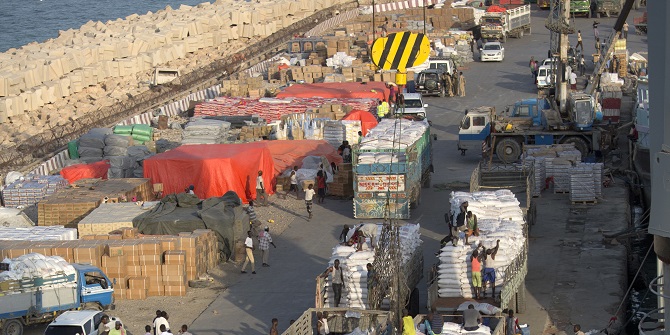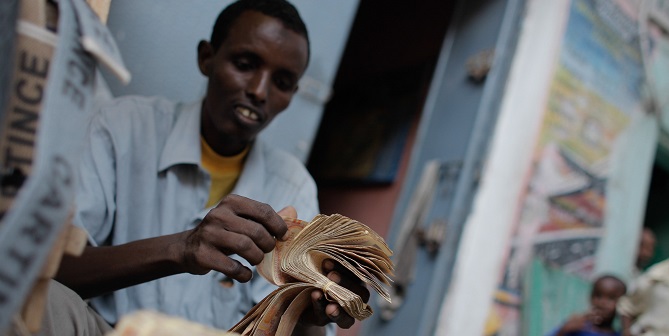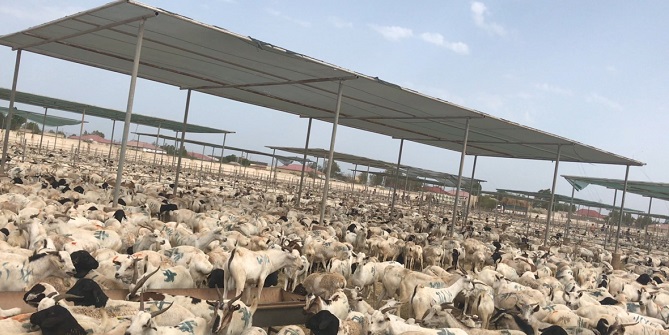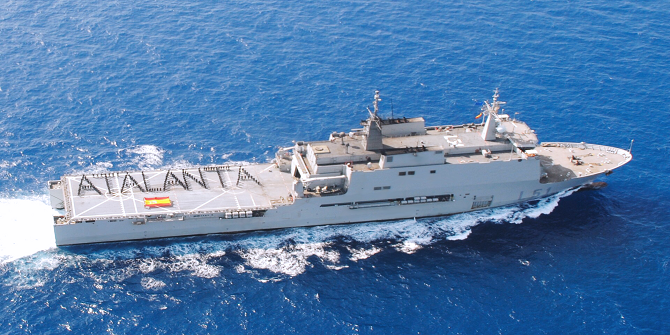
On 22 April a spat broke out between Puntland and Hirshabelle, two of Somalia’s Federal Member States. This came after Puntland leadership suggested it might restrict the movement of imported food commodities from Bossaso port to areas of southern and central Somalia. Rapidly increasing food prices at that time was the claimed rationale, due to the disrupting effect of COVID-19 on global food supply chains. In return, the Governor of Hiraan region, Hirshabelle state, threatened to retaliate by blocking livestock, fruit and vegetable trade with Puntland. This spat initially appeared to indicate both the growing economic effects of COVID-19 as well as potential political instability that could ensue from increased restrictions of borders and commodities. However, while concerns about the impact of COVID-19 in health and economic terms are indeed serious, in the case of this flare up both sides have backed down.
Recent briefs have outlined a number of issues concerning COVID-19 in the Somali context, with a specific focus on the role and importance of the diaspora and their remittances, followed by a second more focused look at the unfolding economic impact in Somaliland. As Alex de Waal suggests, COVID-19 may evolve over time as a series of localised epidemics, with more localised economic and response variations.
This blog explores a number of social, economic and health issues in Puntland in light of the pandemic in order to better understand not only Puntland’s response and localised economic impact, but also the context within which this political spat took place.
COVID-19 in Puntland: cases and responses
As of 2 May, Somalia had recorded 671 positive cases of COVID-19 and 31 deaths, the highest in the Horn of Africa.1 Of this, Puntland reported at least half a dozen positive cases and only one death linked to the virus, although local populations assume these numbers are much higher and point to activity levels at cemeteries as one indicator. After Puntland confirmed its first case in mid-April, the president created the Coronavirus Prevention Committee (CPC) to combat and respond to the emerging outbreak. The task force, like many other task forces in Somalia, has been active on social media and television to create awareness using sophisticated infographics. However, critics of this approach claim that it may not be accessible to all people particularly the illiterate, the poor, vulnerable groups such as children and the elderly, as well as rural populations. A toll-free COVID-19 hotline – 343 – has been set up to provide information but its effectiveness is questioned by those who have used it.
A night-time curfew was imposed by Puntland authorities initially in Bossaso, then in GalkaIo, followed by Garowe. The curfew restricted movements at night while shops and businesses were ordered to close from 7pm onwards. Those most affected by these measures include small business owners such as milk sellers, teashops and barber shops which are busiest at night. Initially the police were very strict in enforcing the curfew, but the reality today is completely different; since the start of Ramadan there is no curfew and businesses are fully operational day and night.
Inter-city travel within Puntland and travel between Puntland and Somaliland has also significantly reduced, affecting both travellers and business. Some restrictions have been eased however such as the seasonal xagaa-bax which sees people leave the extremely hot weather in Bosasso for cooler areas.
Federal authorities banned international flights from 5 March allowing only humanitarian flights to continue functioning. One effect of this is the disruption to returning Somali diaspora which creates a booming ‘summer economy’ in Puntland, as it does in Somaliland. In addition, the travel restrictions and stay-at-home practices of international organisations and local civil society organisations has affected the hospitality sector with no workshops, seminars and conferences taking place. Local travel agencies suggest international travel may resume in early May but there is global uncertainty around when and how travel resumes. The closure of schools, universities and madrassas to prevent the spread of the virus, on 24 March, is likely to be having a similar impact on small businesses to that reported in Somaliland.
Livestock exports
The port of Bosasso, one of the last infrastructure projects implemented by the former Siyad Barre government before its collapse, has been a major livestock export hub since the early 1990s, competing with Berbera for access to markets in the Gulf. The bulk of Somali livestock exported to the Gulf originate from Berbera and Bosasso ports. For a number of reasons including Saudi Arabia’s import ban (on Somalia’s livestock) and the civil war in Yemen, there has been a significant expansion of livestock exports to Oman, from Bosasso as well as from other Somali ports. The bulk of livestock exported through Bosasso originate from southern and central Somalia as well as Somali region of Ethiopia. Bossaso port is therefore dependent on livestock from outside Puntland while these same areas of Somalia and Ethiopia depend on Bossaso for imported commodities; this synergy is well-known and it is this interdependence that played out in the spat between Puntland and Hirshabelle.
There is a long-standing albeit small Somali population based in Salalah, Oman, with strong social and trading relations to the coastal clans that live in the Bari region, in northern Puntland. In recent years Salalah has become an increasingly important hub for both exports and imports from/to Bosasso. Salalah port can handle larger container ships where Bosasso only has the capacity for non-containerised cargo, typically carried on the Indian and Pakistani owned dhows that are rented by Somali traders to move goods in and out of Bosasso. Salalah is the transit port where containerised commodities are transferred to a non-containerised form before being moved to Bossaso. Sheep and goats are the only animals exported from Bossaso. Animals for Oman are forwarded to Muscat, the capital of Oman and to other northern Oman markets, after a few days quarantine in Salalah. A considerable number of animals are also sent directly from Bosasso to Gulf countries including Qatar, Bahrain, and Kuwait.
In late February and March, livestock exports to Oman had slowed noticeably, as COVID-19 restrictions affected buyers. However, demand picked up again with the start of Ramadan, known as a time when livestock consumption and trade increases in the Arabian Peninsula, as well as due to a ban imposed by Oman on frozen meat from Australia and other markets. However, while this increase is a positive development, Somali livestock owners and traders complained that sales of livestock are not at the same level as last year’s Ramadan, due to the uncertainties generated by the global pandemic.
Due to the disruption in the international meat supply, Saudi Arabia has recently suspended its livestock ban imposed in 2016 on Somali animals, due to Rift Valley Fever (RVF)). While this temporary lifting will provide a boost to Somali livestock throughout the region, the volume expected to be imported during this period is considerably lower than during the Hajj season and which is less important for Puntland as most livestock for this market flows through Berbera where major exporters have quarantine facilities.
Food imports
Bossaso port is also an important hub for imported commodities (rice, sugar, wheat flour, cooking oil and rice) to Puntland and its neighbouring regions in southern and central Somalia, as well as the Somali Region of Ethiopia. Puntland traders source foods from a number of international markets; India is the major source for sugar and rice. Flour comes from Oman, Egypt, the UAE and Turkey (Dubai in the UAE being a market hub rather than a producer). Spaghetti is sourced from Turkey, Oman and the UAE. Cooking oil comes from Malaysia. In recent years, Somali traders have been increasingly buying goods directly from source markets rather than mainly through Dubai in the UAE.
During March, concerns about disruptions to global food supply chains were the main talking point among Somali businessmen. These concerns, as COVID-19 lockdowns spread throughout the world, were real, but in Puntland a number of brokers or middle-men deliberately added to these concerns by spreading rumours about impending shortages at the same time as they bought up available stocks. One of the targets of these rumours, for example, was rice exports from India and that rice supply would be restricted. These brokers were not the usual food importers but opportunists looking to hoard stocks and make a substantial profit. Prices rose quickly, with sugar, rice and cooking oil all rising by about 20% within a two-week period. However, by the end of April prices came back down again to near normal levels and these unscrupulous brokers have been caught out as COVID-19 related confusion and uncertainty in March and early April has subsided, against their expectations and actions. They are now looking to sell these foodstuffs in central regions where prices are higher than in Puntland.
Puntland-based food importers are now reported to be less concerned about their ability to source their food commodities. The main remaining difficulty has been with cooking oil, where there have been logistics constraints in Malaysia, due to the lockdown there; cooking oil takes 30-40 days to arrive in Puntland markets from Malaysia (or Indonesia, where it is also sourced).
Remittances, business and credit
As reported in previous briefs, remittances are a crucial source of income and foreign exchange throughout Somalia, although probably of greater importance for northern regions than further south. Diaspora populations connected to Puntland are significant, with research suggesting that, unlike Somaliland, the USA is the single biggest location of the Puntland diaspora, with smaller populations found in many other countries, including Australia.
Concerns about reduced remittances in Puntland are only referred to briefly here as they have been raised in two recent CRP blogs by the same authors. As also reported previously in Somaliland, access to credit has been restricted in Puntland since the COVID-19 outbreak. This affects both formal and informal forms of credit. In Puntland, banks such as Amal, Dahabshiil and Salaama all provide loans and many small businesses take out loans of US$ 10 – 20,000. Livestock traders are amongst the users of this facility. Over the last 1-2 months, access to these loans has almost completely dried up as the banks are not sure that people will be able to make the monthly repayments, with actual and expected reduction in remittances, as well as the general economic worries being blamed. However, there are expectations that these facilities will start to re-open in May.
Concluding remarks
This blog has highlighted how the port of Bosasso is a critical entry hub for a highly integrated import/export market network that links Bosasso with a huge hinterland well beyond Puntland’s own borders. Beledweyn town in Hiraan region is one of the main market towns connected to Bosasso, with both towns providing a significant tax income for their respective authorities. COVID-19 has already disrupted these trade networks which make up the backbone of the Somali economy, and many other detrimental economic effects are taking place. Some of the economic restrictions associated with COVID-19 may be lifted this month in Puntland, and while this may have a positive effect (although perhaps negative health effects), the economic outlook remains extremely worrying in the weeks and months ahead in terms of household income and government revenue. These will need to be closely watched as recommended in previous briefs.
Outbursts by political figures can be difficult to interpret and may be significant or reflect issues other than those related to COVID-19. Puntland’s antagonistic comments are thought to be limited to the President rather than reflecting any underlying tensions with Hirshabelle. The reactionary response from the Governor of Hiraan reflects a much more unstable picture in Hirshabelle, in particular in Hiraan region, where there are several inter-clan conflicts all involving the Hawadle, as well as tensions within the Hawadle themselves. It is however important to note that these tensions did not escalate and other entities such as Galmudug state, lying in between Puntland and Hirshabelle, did not become involved.
1 Federal Ministry of Health includes cases from Puntland (as well as Somaliland) in its COVID-19 updates.
Many thanks for comments from Mark Bradbury.
Note: The CRP blogs gives the views of the author, not the position of the Conflict Research Programme, the London School of Economics and Political Science, or the UK Government.






The article is an extraordinary piece shedding light on the economic impact of Covid 19 in Puntland citing the recent spat with Hirshabelle. However, the concluding remarks capturing names of Somali clans might damage the good faith the article was written with, ignite unnecessary animosity and may convey negative message on your future analysis on similar subjects.
I echo what Abdi Aden sited mentioning clan names will always add to negativity to the good work you are trying to enlighten us to